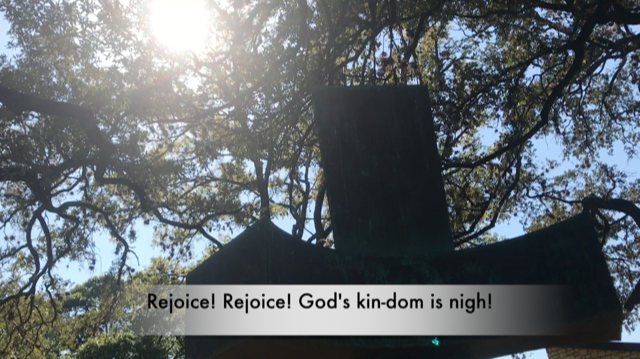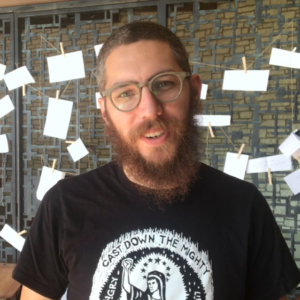I don’t know about you, but for me, music has real power. Music has always been such an important part of my faith and early on I learned to play and sing and write music as part of my own spiritual practice. Here at Seminary of the Southwest I’ve had the opportunity to continue that practice by leading music at some of our services and it’s been such a blessing.
I love this idea, then, that the Church has always sung songs and used music as part of its spiritual practice. We can go back to Scripture itself and see the hymns of the early Church. One of my favorites is the Christ hymn in Philippians chapter 2.
“Let the same mind be in you that was in Christ Jesus,
who, though he was in the form of God,
did not regard equality with God
as something to be exploited,
but emptied himself,
taking the form of a slave,
being born in human likeness.
And being found in human form,
he humbled himself
and became obedient to the point of death—
even death on a cross.
Therefore God also highly exalted him
and gave him the name
that is above every name,
so that at the name of Jesus
every knee should bend,
in heaven and on earth and under the earth,
and every tongue should confess
that Jesus Christ is Lord,
to the glory of God the Father.”
(Philippians 2:5-11, NRSV)
The shape of this hymn is a shape we see often in the gospels where the first are last and the last are first (Mt. 20:16)—where the mighty are cast down and the lowly are lifted up (Lk 1:52). In this Hymn we see that according to the privilege Jesus carried, he was humbled and according to the humility—or even humiliation—that Jesus bore, he was empowered.
Throughout my experience in seminary, I keep coming back to this hymn and this shape, particularly in the context of the work of racial healing and in learning how to hold the privilege that I carry as a white man. It has become my constant prayer—my mantra, my refrain.
Now to a certain extent, all of us carry some amount of privilege, and to a certain extent all of us have places in our lives that could use some empowerment, but in a society shaped by the forces of systemic racism and white supremacy, many of us have a lot more work to do in the area of humility and others will have more to do in the work of inner empowerment.
One of the learning curves I’ve experienced in my engagement with the work of racial justice is that it involves just as much inner work as it does outer. The work of racial healing is a contemplative practice as well as a social and active practice, which requires us to look deep within and learn how to let go of the destructive and racist influences by which our egos have been shaped.
This week as I was reflecting on these themes, I found myself reimagining this early hymn of the Church in our own day and wrote the words to a new hymn set to an old, familiar, and haunting tune of longing and I asked my friend Megan if she would join me in singing. My hope is that it captures the shape of the gospel which demands the humbling of those in power and the empowerment of those disempowered. My prayer is that as we take on the same mind that was in Christ, we, the Church, more and more will become the body of Christ.
May the same mind be in you that was in Christ,
who thought not of himself, but sacrifice,
whose privilege made no claim on others’ lives,
but sought humility in place of pride. (Refrain)
May the same mind be in you which hears their pain,
and knows it’s all wrapped up in your own gain,
a system built on necks to keep you king,
come down from your false throne and seek healing. (Refrain)
May the same mind be in you which heeds the plea,
to take up your responsibility,
which seeks not just to offer sympathy,
but works to cast down white supremacy. (Refrain)
Refrain:
Rejoice, rejoice, God’s kin-dom is nigh!
The Church becomes the body of Christ.
May the same mind be in you that was in Christ,
empowered in a world thats filled with lies,
the beauty of your skin, never denied,
a holy sacrament of love and pride. (Refrain)
May the same mind be in you which finds Christ’s rest,
the breath of God that’s deep within your chest.
Stand strong against the ones who would oppress;
take on the name they one day will confess. (Refrain)
May the same mind be in you, O Child of God,
be lifted up and stand where you belong,
beloved by God who from the very start,
has joined you in the struggle where you are. (Refrain)
Words: Derek Larson, TSSF, inspired by Philippians 2:5-11.
Music: Veni, veni, Emmanuel, Mode 1, Processionale, 15th cent.;
adapt. Thomas Helmore (1811-1890), Derek Larson, TSSF (1987-)
*The background images in the video feature commitments written by SSW students, faculty, and staff to engage in the work of racial justice at a recent community initiated chapel service bearing witness to lament and hope and placed in Christ Chapel. In the light of the chapel window are also the names of many killed from the deadly mix of racism and police brutality. May they rise with Christ in glory.
This fall, the Sowing Holy Questions blog will focus on issues of racial healing. Writers will reflect on what has been done, what change ought to happen, and offer visions for healing in our communities.



